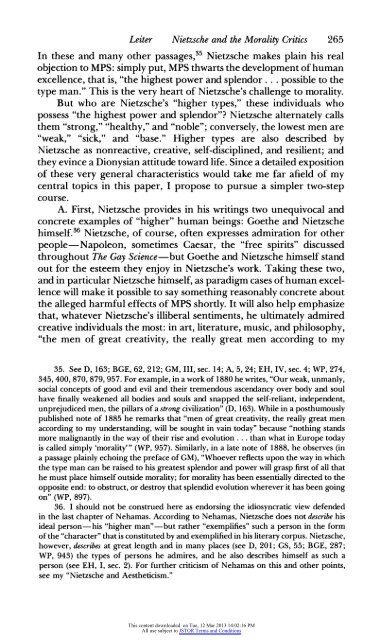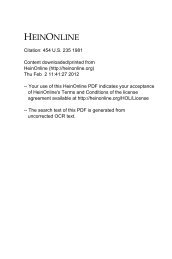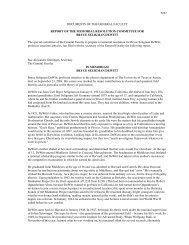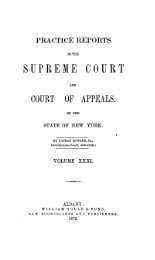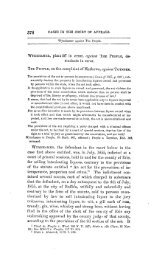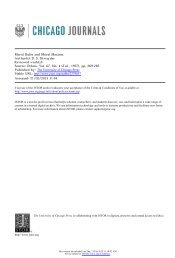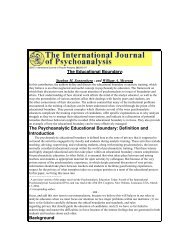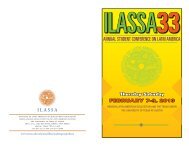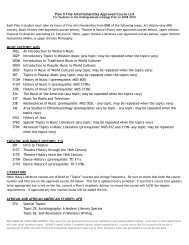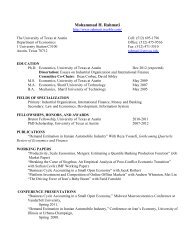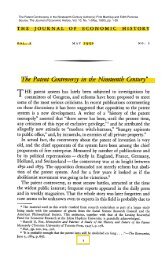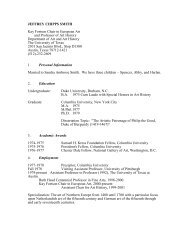Nietzsche and the Morality Critics - The University of Texas at Austin
Nietzsche and the Morality Critics - The University of Texas at Austin
Nietzsche and the Morality Critics - The University of Texas at Austin
Create successful ePaper yourself
Turn your PDF publications into a flip-book with our unique Google optimized e-Paper software.
Leiter <strong>Nietzsche</strong> <strong>and</strong> <strong>the</strong> <strong>Morality</strong> <strong>Critics</strong> 265In <strong>the</strong>se <strong>and</strong> many o<strong>the</strong>r passages,35 <strong>Nietzsche</strong> makes plain his realobjection to MPS: simply put, MPS thwarts <strong>the</strong> development <strong>of</strong> humanexcellence, th<strong>at</strong> is, "<strong>the</strong> highest power <strong>and</strong> splendor. . . possible to <strong>the</strong>type man." This is <strong>the</strong> very heart <strong>of</strong> <strong>Nietzsche</strong>'s challenge to morality.But who are <strong>Nietzsche</strong>'s "higher types," <strong>the</strong>se individuals whopossess "<strong>the</strong> highest power <strong>and</strong> splendor"? <strong>Nietzsche</strong> altern<strong>at</strong>ely calls<strong>the</strong>m "strong," "healthy," <strong>and</strong> "noble"; conversely, <strong>the</strong> lowest men are"weak," "sick," <strong>and</strong> "base." Higher types are also described by<strong>Nietzsche</strong> as nonreactive, cre<strong>at</strong>ive, self-disciplined, <strong>and</strong> resilient; <strong>and</strong><strong>the</strong>y evince a Dionysian <strong>at</strong>titude toward life. Since a detailed exposition<strong>of</strong> <strong>the</strong>se very general characteristics would take me far afield <strong>of</strong> mycentral topics in this paper, I propose to pursue a simpler two-stepcourse.A. First, <strong>Nietzsche</strong> provides in his writings two unequivocal <strong>and</strong>concrete examples <strong>of</strong> "higher" human beings: Goe<strong>the</strong> <strong>and</strong> <strong>Nietzsche</strong>himself.36 <strong>Nietzsche</strong>, <strong>of</strong> course, <strong>of</strong>ten expresses admir<strong>at</strong>ion for o<strong>the</strong>rpeople-Napoleon, sometimes Caesar, <strong>the</strong> "free spirits" discussedthroughout <strong>The</strong> Gay Science-but Goe<strong>the</strong> <strong>and</strong> <strong>Nietzsche</strong> himself st<strong>and</strong>out for <strong>the</strong> esteem <strong>the</strong>y enjoy in <strong>Nietzsche</strong>'s work. Taking <strong>the</strong>se two,<strong>and</strong> in particular <strong>Nietzsche</strong> himself, as paradigm cases <strong>of</strong> human excellencewill make it possible to say something reasonably concrete about<strong>the</strong> alleged harmful effects <strong>of</strong> MPS shortly. It will also help emphasizeth<strong>at</strong>, wh<strong>at</strong>ever <strong>Nietzsche</strong>'s illiberal sentiments, he ultim<strong>at</strong>ely admiredcre<strong>at</strong>ive individuals <strong>the</strong> most: in art, liter<strong>at</strong>ure, music, <strong>and</strong> philosophy,"<strong>the</strong> men <strong>of</strong> gre<strong>at</strong> cre<strong>at</strong>ivity, <strong>the</strong> really gre<strong>at</strong> men according to my35. See D, 163; BGE, 62, 212; GM, III, sec. 14; A, 5, 24; EH, IV, sec. 4; WP, 274,345,400, 870, 879, 957. For example, in a work <strong>of</strong> 1880 he writes, "Our weak, unmanly,social concepts <strong>of</strong> good <strong>and</strong> evil <strong>and</strong> <strong>the</strong>ir tremendous ascendancy over body <strong>and</strong> soulhave finally weakened all bodies <strong>and</strong> souls <strong>and</strong> snapped <strong>the</strong> self-reliant, independent,unprejudiced men, <strong>the</strong> pillars <strong>of</strong> a strong civiliz<strong>at</strong>ion" (D, 163). While in a posthumouslypublished note <strong>of</strong> 1885 he remarks th<strong>at</strong> "men <strong>of</strong> gre<strong>at</strong> cre<strong>at</strong>ivity, <strong>the</strong> really gre<strong>at</strong> menaccording to my underst<strong>and</strong>ing, will be sought in vain today" because "nothing st<strong>and</strong>smore malignantly in <strong>the</strong> way <strong>of</strong> <strong>the</strong>ir rise <strong>and</strong> evolution ... than wh<strong>at</strong> in Europe todayis called simply 'morality"' (WP, 957). Similarly, in a l<strong>at</strong>e note <strong>of</strong> 1888, he observes (ina passage plainly echoing <strong>the</strong> preface <strong>of</strong> GM), "Whoever reflects upon <strong>the</strong> way in which<strong>the</strong> type man can be raised to his gre<strong>at</strong>est splendor <strong>and</strong> power will grasp first <strong>of</strong> all tha<strong>the</strong> must place himself outside morality; for morality has been essentially directed to <strong>the</strong>opposite end: to obstruct, or destroy th<strong>at</strong> splendid evolution wherever it has been goingon" (WP, 897).36. I should not be construed here as endorsing <strong>the</strong> idiosyncr<strong>at</strong>ic view defendedin <strong>the</strong> last chapter <strong>of</strong> Nehamas. According to Nehamas, <strong>Nietzsche</strong> does not describe hisideal person-his "higher man"-but ra<strong>the</strong>r "exemplifies" such a person in <strong>the</strong> form<strong>of</strong> <strong>the</strong> "character" th<strong>at</strong> is constituted by <strong>and</strong> exemplified in his literary corpus. <strong>Nietzsche</strong>,however, describes <strong>at</strong> gre<strong>at</strong> length <strong>and</strong> in many places (see D, 201; GS, 55; BGE, 287;WP, 943) <strong>the</strong> types <strong>of</strong> persons he admires, <strong>and</strong> he also describes himself as such aperson (see EH, I, sec. 2). For fur<strong>the</strong>r criticism <strong>of</strong> Nehamas on this <strong>and</strong> o<strong>the</strong>r points,see my "<strong>Nietzsche</strong> <strong>and</strong> Aes<strong>the</strong>ticism."This content downloaded on Tue, 12 Mar 2013 14:02:16 PMAll use subject to JSTOR Terms <strong>and</strong> Conditions


